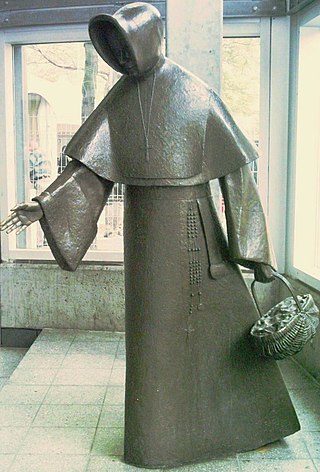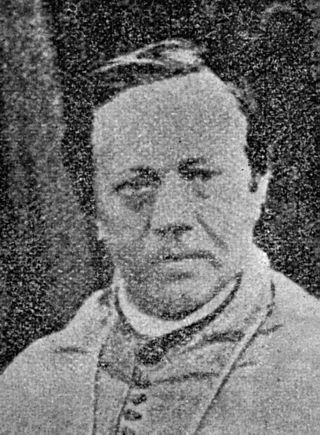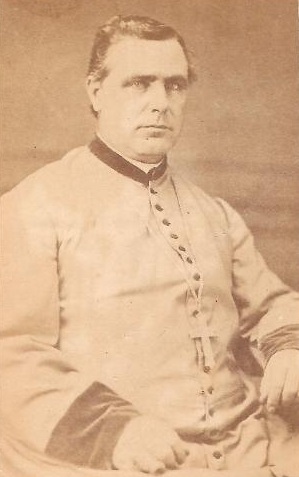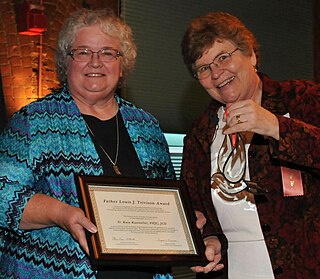Related Research Articles

The Diocese of Fort Wayne–South Bend is a Latin Church ecclesiastical territory, or diocese, of the Catholic Church in north-central and northeastern Indiana in the United States.

The Sisters of St. Joseph, also known as the Congregation of the Sisters of St. Joseph, abbreviated CSJ or SSJ, is a Catholic religious congregation of women founded in Le Puy-en-Velay, France, in 1650. This congregation, named for Saint Joseph, has approximately 14,000 members worldwide: about 7,000 in the United States; 2,000 in France; and are active in 50 other countries.

The Sisters of Providence are a religious institute of Roman Catholic sisters founded in 1843 by Émilie Gamelin. They are headquartered in Montreal, Quebec with five provinces: Mother Joseph Province, Holy Angels Province, Philippines Vice-Province, Émilie-Gamelin Province and Bernard Morin Province.
The Sisters of St. Francis of Perpetual Adoration is a papal congregation of the Roman Catholic Church, founded on July 20, 1863, by Mother Maria Theresia Bonzel in Olpe, Germany. In 1875, they opened St. Elizabeth Hospital in Lafayette, Indiana; now part of the Franciscan Health healthcare system. In 1890 they founded Saint Francis Normal School, a teacher training school; which is now the University of Saint Francis (Indiana).
The Sisters of the Holy Cross are one of three Catholic congregations of religious sisters which trace their origins to the foundation of the Congregation of Holy Cross by Basil Moreau in Le Mans, France in 1837. Members designate themselves with the post-nominals CSC.

John Henry Luers was an American prelate of the Roman Catholic Church. He served as the first bishop of the new Diocese of Fort Wayne in Indiana from 1858 until his death in 1871.
The Third Order of Saint Francis is a third order in the Franciscan tradition of Christianity, founded by the medieval Italian Catholic friar Francis of Assisi.

Dernbach (Westerwald) is a local community (Ortsgemeinde) in the district of Westerwaldkreis in Rhineland-Palatinate, Germany, and part of the municipal association Verbandsgemeinde Wirges. The village is known throughout the country by the three-way interchange A48/A3, called Dernbacher Dreieck, and well known worldwide by the international congregation Poor Handmaids of Jesus Christ, called Dernbacher Schwestern.
Jacques-Maurice des Landes d’Aussac de Saint Palais was an American prelate of the Roman Catholic Church. He served as the fourth Bishop of Vincennes, from 1848 until his death.
The Missionary Sisters of the Sacred Heart of Jesus is a Catholic female religious congregation founded in 1880 by Frances Xavier Cabrini. Their aim is to spread devotion to the Sacred Heart by means of spiritual and corporal works of mercy.

The Sisters of Providence of Saint Mary-of-the-Woods are an apostolic congregation of Catholic women founded by Saint Theodora Guerin at Saint Mary-of-the-Woods, Indiana, in 1840. Mother Theodore and her five companion sisters departed from the Sisters of Providence of Ruillé-sur-Loir, France, at the invitation of the Bishop of Vincennes, Indiana, to found the Sisters of Providence in the United States. In 1843, the Indiana congregation became independent of the religious institute in Ruillé, and the Rules of the Congregation were approved by the Holy See in 1887.

Joseph Gregory Dwenger, C.P.P.S was an American prelate of the Catholic Church. He served as Bishop of Fort Wayne from 1872 to 1893.

Joseph Rademacher was an American prelate of the Roman Catholic Church. He served as bishop of the Diocese of Nashville in Tennessee from 1883 to 1893 and as bishop of the Diocese of Fort Wayne in Indiana from 1893 until his death in 1900.

Mother Mary Cleophas Foley, S.P., was the Superior General of the Sisters of Providence of Saint Mary-of-the-Woods, Indiana from 1890 to 1926. During her time in office, she completed the building of the Church of the Immaculate Conception and built numerous other buildings at Saint Mary-of-the-Woods, Indiana, including a new Providence Convent, the Blessed Sacrament Chapel, and an infirmary.
St. Joseph Hospital, known commonly as "St. Joe," was the first hospital founded in Fort Wayne, Indiana, United States, opening in 1869. St. Joseph's was sold in 1998, and continued to operate under Lutheran Health Network until 2021 when staff and equipment were transferred to the newly opened Lutheran Downtown Hospital. "Old St. Joe's" was demolished in 2022.
The Little Franciscans of Mary (P.F.M.) is a Catholic congregation of women. Founded in Worcester, Massachusetts, the motherhouse is in Baie St. Paul, Quebec.
The Sisters of the Precious Blood is a Roman Catholic female religious order founded in 1845 in Steinerberg, Switzerland by Magdalene Weber and a number of young women from Baden.

Maria Katharina Kasper – born Katharina but in religion known as Schwester / sister Maria – was a German Roman Catholic religious sister and the founder of the Poor Handmaids of Jesus Christ. Kasper entered the religious life later in her life despite having harbored a desire to become a religious sister for a very long time. It did not materialize earlier due to aggravating circumstances such as the deaths of both her father and her brother, and Kaspers' poor economic status. Moreover, due to the secularization under Napoleon, no female religious orders existed in her region. Her dedication to the poor and the will was noted during the course of her life and she dedicated herself to this work with great zeal.

Kate Kuenstler (1949-2019) was an American Roman Catholic sister and a canon lawyer. Her legal defense of the canonical rights of lay people changed Vatican policy. Previously the Holy See automatically accepted U.S. bishops' decisions to close and sell vibrant churches. After her intervention its policy became one that preserves those churches as worship sites instead.
References
- ↑ "Saint Maria Katharina Kasper' FaithND
- 1 2 Secunda, Mary. "Poor Handmaids of Jesus Christ." The Catholic Encyclopedia Vol. 12. New York: Robert Appleton Company, 1911. 10 October 2022
 This article incorporates text from this source, which is in the public domain .
This article incorporates text from this source, which is in the public domain . - ↑ St Joseph's Catholic Primary School, Hendon
- ↑ Wilson, James Grant; Fiske, John (1888). Appletons' Cyclopædia of American Biography. D. Appleton.
- ↑ "Our History", Poor Handmaids of Jesus Christ
- ↑ Alerding, Herman Joseph. The Diocese of Fort Wayne, 1857-September 1907, Fort Wayne, Indiana., Archer Print Company, 1907, p. 456
- ↑ "Welcome to Our Newest Location - Marian University’s Ancilla College"
- ↑ "Poor Handmaids of Jesus Christ", Nigerian Conference of Women Religious
- ↑ "Hospital", PHJC Kenya
- ↑ "Poor Handmaids of Jesus Christ Records", Hesburgh Libraries, ND
![]() This article incorporates text from a publication now in the public domain : Herbermann, Charles, ed. (1913). "Poor Handmaids of Jesus Christ". Catholic Encyclopedia . New York: Robert Appleton Company.
This article incorporates text from a publication now in the public domain : Herbermann, Charles, ed. (1913). "Poor Handmaids of Jesus Christ". Catholic Encyclopedia . New York: Robert Appleton Company.